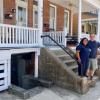Temporary tent city sprouts up on former Troop 7 site
About two dozen tents neatly arranged where Troop 7 once stood on Route 1 outside Lewes are part of a collaborative effort to provide workforce housing for those who have none.
The camp went up Oct. 15 for 14 men and 14 women, all of whom signed lengthy contracts agreeing to abide by a long list of rules and agree to work with a case manager, said Mike Agnew, volunteer program coordinator for Cape Code Purple.
“All of these people are guests of Code Purple,” he said. “We’ve taken people who were in the woods, and moved them to a more open area.”
Agnew describes the residents as part of the working homeless. All but two had jobs when they agreed to the camp's rules, Agnew said, although some of the seasonal work has started to dwindle. The two who didn’t have jobs are women in their 70s, he said.
Agnew and his band of volunteers, mostly from area churches, were first drawn to the existing tent city behind the former Delaware State Police barrack in an effort to create a sanitary environment.
That effort quickly grew into an ad hoc group of county and state officials, community and healthcare groups, and the Delaware State Police. These include First State Community Action Agency and Beebe Healthcare.
Agnew presented the state Office of Management and Budget with an official proposal to operate a camp for 45 days until Nov. 30, and with it included a 10-page safety protocol. After signing a contract agreeing to the camp rules, residents receive a permit allowing them to live there. A file complete with their photo and contact information is created and will be shared with police officers who will routinely monitor the site, Agnew said.
Each tent is numbered and corresponds to the resident’s permit. No one but the resident is allowed to stay in the tents, and there is to be no noise after 10 p.m.
“The agreement basically says we’ve given you permission to be here, but you have to behave,” he said. “They were verbally read each line.”
Violations are divided into major and minor. Major violations such as violence or drug use warrant immediate removal, Agnew said. Minor violations would prompt a warning, and then review.
A liability release and hold-harmless agreement are also part of the contract. As an incentive, Agnew said all residents qualify for winter shelter starting Dec. 1 if they are good tenants.
The short-term program is one Agnew said he hopes can be emulated throughout the state. He likens the camp to a military bivouac. Each tent is placed on a 20-square-foot site. Port-a-potties and a washstand are available for residents to use. Volunteers drive residents to a shower facility throughout the week. Food kitchens throughout the area provide food.
“It’s a way to give people a sense of their dignity back,” he said. “Now we’re helping people move on with their lives.”
Melissa Steele is a staff writer covering the state Legislature, government and police. Her newspaper career spans more than 30 years and includes working for the Delaware State News, Burlington County Times, The News Journal, Dover Post and Milford Beacon before coming to the Cape Gazette in 2012. Her work has received numerous awards, most notably a Pulitzer Prize-adjudicated investigative piece, and a runner-up for the MDDC James S. Keat Freedom of Information Award.























































